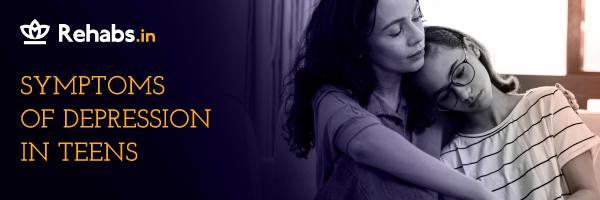Symptoms of Depression in Teens

15 Symptoms of Depression in Teens
Is your teenage daughter or son simply experiencing the ups and downs of adolescence, or could they be displaying signs of depression? The teenage years can be challenging for both parents and children as they navigate the process of self-discovery. Understanding the symptoms of depression in teens is crucial to providing them with the necessary support and assistance when needed.
With the pressures of academics, extracurriculars, and maintaining an active social life both online and offline, teens often face significant stress. Understanding and identifying depression symptoms in teens is of utmost importance as it can have a profound impact on their overall well-being and future development.
Normalising conversations about mental health can lead to early detection of depression symptoms, allowing for timely intervention and support. Schools, parents, and communities play a vital role in fostering open dialogue and encouraging teens to seek help without feeling judged.
In this article, we discuss 15 common symptoms of depression in teens.
1. Persistent Sadness or Hopelessness:
Teens experiencing persistent sadness may feel an overwhelming sense of sorrow, sadness, or emotional pain that seems to have no clear cause or end. This sadness can persist for weeks, months, or even longer, causing a constant emotional burden on the teen’s psyche.
Similarly, feelings of hopelessness may arise when a teen perceives their situation as unchangeable or impossible to improve. They may lack optimism about the future and may believe that things will never get better, leading to a sense of despair.
2. Irritability and Anger:
Teens experiencing irritability and anger due to depression may have a heightened sensitivity to various stimuli, making them easily agitated or annoyed. Even minor stressors or everyday challenges that they might have handled without issue before can trigger strong emotional reactions. This irritability often leads to frequent outbursts of anger, which can be intense and difficult to manage.
Teenagers with depression may find it challenging to control their emotions, and as a result, they react more strongly to situations or interactions that they perceive as negative or overwhelming. Their irritability can lead to conflicts with family members, friends, or peers, causing strained relationships and further contributing to their emotional distress.
3. Social Withdrawal:
Adolescence is a period when social connections and friendships are particularly important for emotional development. However, teenagers with depression often find it challenging to engage in social interactions and may withdraw from social activities and relationships.
They may make excuses to skip events or isolate themselves from others, preferring solitude over socialising. They may feel like they don’t belong or that others wouldn’t understand their struggles, making it challenging to reach out for support. The lack of social support and connection may intensify their depressive symptoms.
4. Changes in Sleep Patterns:
Teens with depression may experience difficulty falling asleep or staying asleep, a condition known as insomnia. Racing thoughts, worry, and emotional distress can make it challenging for them to relax and drift off into a restful slumber. They may spend long hours lying awake in bed, feeling frustrated and exhausted.
On the other hand, some depressed teenagers may exhibit hypersomnia, which is excessive sleepiness or prolonged periods of sleep. They may find themselves sleeping for unusually long hours but still feeling fatigued and lacking energy during the day.
5. Fatigue and Lack of Energy:
Teens with depression often experience a combination of physical and emotional exhaustion. The constant emotional distress, feelings of sadness, and negative thought patterns can be mentally draining, while the lack of motivation and interest in daily activities can lead to physical fatigue.
As mentioned earlier, depression can disrupt sleep patterns, leading to insomnia or hypersomnia. Poor sleep quality, difficulty falling or staying asleep, or excessive sleepiness during the day can contribute to a perpetual state of fatigue.
6. Significant Changes in Appetite:
Depression can suppress the appetite in some teenagers, leading to a loss of interest in food and eating. They may find it difficult to muster up the motivation to eat, even when they are physically hungry. As a result, they may skip meals or eat very little, leading to weight loss.
On the other hand, some teenagers may turn to food as a way to cope with their emotional distress, engaging in emotional eating. They might find comfort in sugary or high-calorie foods, leading to an increase in caloric intake and, subsequently, weight gain.
7. Difficulty Concentrating:
Depression can affect various cognitive functions, including attention, memory, and decision-making abilities. This can make it challenging for teenagers to concentrate on tasks that require sustained attention and focus. They may experience mental fog, which hampers their ability to process information efficiently.
8. Academic Decline:
Depression can affect various aspects of a teen’s academic life, leading to challenges in keeping up with schoolwork and a decline in grades. They may find it difficult to muster the energy and enthusiasm to engage in schoolwork, leading to procrastination and falling behind in their studies.
Depression can lead to physical and mental exhaustion, making it difficult to participate actively in class or complete assignments. They may struggle to stay attentive in class and retain information, which can affect their ability to perform well on exams and assignments.
9. Loss of Interest in Activities:
Loss of interest in activities, also known as anhedonia, is a prominent symptom of depression in teenagers. Anhedonia is the diminished ability to experience pleasure or interest in activities that were previously enjoyable or engaging. Hobbies, sports, and social events that used to bring them happiness and fulfilment may now seem uninteresting or emotionally flat.
10. Physical Complaints:
Although depression is primarily associated with emotional and cognitive symptoms, it can also manifest as various physical symptoms. These physical complaints are often referred to as somatic symptoms and can be a result of the mind-body connection.
These may include the following problems:
- Stomach aches
- Digestive problems
- Muscle pain like headaches, back or neck pain
- Overall fatigue in the body
- Frequent sickness due to poor immunity
11. Thoughts of Death or Suicide:
Depression can create a pervasive sense of hopelessness, making teens believe that their emotional pain is unending and unbearable. They may feel trapped in their circumstances and see no way out. They may experience intense emotional distress, which may lead them to consider suicide as a means to escape their suffering.
Suicidal ideation is among the most serious and concerning symptoms of depression in teenagers. If you encounter a teen experiencing such thoughts, take it seriously, provide a supportive environment, and seek professional help immediately.
12. Low Self-Esteem and Self-Worth:
Teens with depression often have a distorted and negative view of themselves. They may focus on perceived flaws and shortcomings, leading to feelings of inadequacy and self-doubt.
They may engage in constant self-criticism, blaming themselves for their struggles and perceived failures. This self-critical mindset can contribute to a downward spiral of self-esteem and exacerbate their depressive feelings. This can lead to feelings of worthlessness and a belief that they are not valuable or deserving of happiness and success.
13. Increased Sensitivity to Rejection:
People with depression often experience negative thought patterns, such as cognitive distortions. These thought patterns can lead them to interpret neutral or ambiguous situations as evidence of rejection or disapproval.
Depression can make teenagers emotionally vulnerable, leaving them more susceptible to negative emotions triggered by perceived rejection or criticism. Increased sensitivity to rejection can strain relationships with friends, family, and peers. Teens may become guarded and struggle to trust others.
14. Substance Abuse:
Teens with depression may use drugs or alcohol as a form of self-medication to numb their emotional pain or escape from distressing thoughts and feelings temporarily. Substance abuse might serve to alleviate these negative emotions for the time being. They might also be influenced by peers who engage in substance abuse as a way to fit in or cope with their own struggles.
The desire to escape from reality and avoid facing life’s challenges can drive some teens to try doing drugs. Understanding the link between depression and substance abuse is vital for early detection and prevention. If you suspect that a teen is engaging in substance abuse and struggling with depression, seek professional help promptly.
15. Self-Criticism or Feelings of Worthlessness:
Teenagers with depression often have a negative view of themselves and may magnify their perceived flaws or shortcomings. They may excessively focus on their mistakes and failures, leading to feelings of inadequacy.
They may engage in constant self-criticism, putting themselves down and blaming themselves for their struggles. This internal dialogue can be harsh and unrelenting. Self-criticism and feelings of worthlessness can affect how teenagers relate to others. They may withdraw from social interactions, fearing judgment or rejection from others.
Understanding and identifying depression symptoms in teens is a vital responsibility shared by parents, teachers, and communities. By breaking the stigma surrounding mental health and normalising conversations about emotional well-being, we can create an environment where teenagers feel comfortable seeking help and support.
Early recognition and intervention can make a significant difference in the lives of teens, setting them on a path towards improved mental health and a brighter future. You can browse treatment centres for depression across India on our directory here.
Sources:
Franche, R. L., & Dobson, K. (1992). Self-criticism and interpersonal dependency as vulnerability factors to depression. Cognitive Therapy and Research, 16, 419-435.
Nhs. (2023, July 25). Depression in children and young people. nhs.uk. https://www.nhs.uk/mental-health/children-and-young-adults/advice-for-parents/children-depressed-signs/
Teen Depression: more than just moodiness. (n.d.). National Institute of Mental Health (NIMH). https://www.nimh.nih.gov/health/publications/teen-depression
Winsler, A., Deutsch, A., Vorona, R. D., Payne, P. A., & Szklo-Coxe, M. (2015). Sleepless in Fairfax: the difference one more hour of sleep can make for teen hopelessness, suicidal ideation, and substance use. Journal of youth and adolescence, 44, 362-378.













